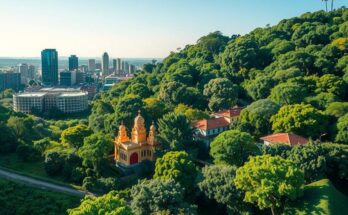Abdullah Ocalan, the 75-year-old PKK leader, has called for peace from prison, urging the disarmament of his group to potentially end a 40-year conflict with Turkey. Supported by both government and opposition parties, this appeal represents a major turn in efforts to resolve the longstanding violence that has claimed more than 40,000 lives.
Abdullah Ocalan, the 75-year-old leader of the Kurdistan Workers Party (PKK), has spent 25 years in prison following his initiation of an armed struggle against the Turkish government in pursuit of Kurdish independence. Recently, he called for peace from his detention at Imrali Island prison, urging the PKK to disarm and dissolve. This significant plea could potentially end a 40-year conflict that has resulted in over 40,000 fatalities and altered the landscape of Turkish society and politics.
Ocalan’s call for peace came in response to a request from a political ally of President Tayyip Erdogan. Both Erdogan and the pro-Kurdish opposition have expressed support for ending the violence that has historically marked the Kurdish issue within Turkey. In a letter, Ocalan stated, “I am making a call for the laying down of arms, and I take on the historical responsibility for this call,” reflecting his desire for reconciliation.
The potential engagement with Ocalan by the government was first mentioned by Devlet Bahceli, a prominent ultra-nationalist politician and Erdogan’s ally, who surprisingly offered a possibility of Ocalan’s release contingent upon the PKK’s cessation of hostilities. Ocalan’s influence peaked during the 2013-2015 peace negotiations with the Turkish state, during which he became a prominent figure for Kurdish aspirations.
Ocalan’s past involvement in peace talks marked a high point in his political trajectory, yet efforts dwindled following the breakdown of negotiations, leading to an escalation in violence. Originally, Ocalan founded the PKK in 1978 amid socio-political upheaval in Turkey and resorted to armed conflict after his political ideologies diverged from those of the Turkish left. His eventual capture in 1999 marked a critical turning point for the Kurdish movement.
Since his incarceration, Ocalan has remained a symbolic figure for many Kurdish nationalists, despite his imprisonment. His rich history and ongoing efforts for peace highlight the complexities of the Kurdish issue and the ongoing struggle for autonomy within Turkey, emphasizing the need for a long-term resolution to this deeply rooted conflict.
In summary, Abdullah Ocalan continues to exert considerable influence from prison, advocating for peace and urging the PKK to disarm in order to end decades of conflict. His recent statements signal a significant shift in the approach to the Kurdish issue within Turkey. The response from both the Turkish government and Kurdish parties suggests a potential pathway towards reconciliation, although challenges remain in realizing this goal.
Original Source: indianexpress.com




